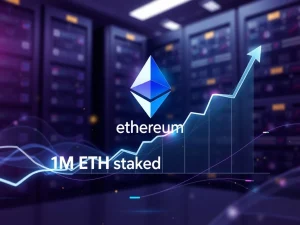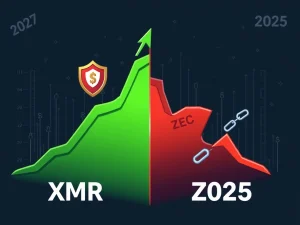ETH, SOL Staking ETFs: Breakthrough Launch Imminent Via Regulatory ‘End-Around’

Get ready for a potential game-changer in the crypto investment space. Analysts are buzzing about the possibility of the first U.S. exchange-traded funds (ETFs) offering exposure to both Ethereum (ETH) and Solana (SOL) with a crucial feature: staking. This has been a highly anticipated development, and recent filings suggest these products could debut sooner than many expected, thanks to what’s being called a ‘regulatory end-around’.
Navigating the Regulatory Landscape for Staking ETFs
The path to crypto ETFs in the United States has been complex, particularly when it comes to including staking rewards. Traditional spot crypto ETFs have faced hurdles adding this feature. However, ETF provider REX Shares appears to have found a unique way forward with its recent filings for ETH and SOL staking ETFs. ETF analyst James Seyffart highlighted that these filings employ a “regulatory end-around” strategy, potentially allowing them to bypass some typical approval processes.
Understanding the Unique Structure of These ETFs
What makes the REX Shares filings stand out? According to analysts, the proposed ETFs utilize a “very rare” structure for the ETF world: they are classified as C-corporations for tax purposes. This differs significantly from typical ETF structures. REX Shares explained in their filing that this C-corp classification means the fund will incur current and deferred tax expenses, which will be reflected in the fund’s Net Asset Value (NAV). This structure is key to the “regulatory workarounds” identified by analysts like James Seyffart, who noted these are “40-act funds with a unique structure and do not go through the 19b-4 process” typically required for rule changes or new product types by exchanges.
Why Staking is Crucial for ETH and SOL ETFs
For many investors, staking is an integral part of holding assets like ETH and SOL. Staking allows holders to earn rewards by participating in the network’s consensus mechanism. Industry executives have argued that a spot ETH ETF, for example, feels “incomplete” without the ability to offer staking yield to investors. BlackRock’s head of digital assets previously described their Ether ETF as a “tremendous success” but acknowledged its limitation without staking. The REX Shares filings explicitly state the funds seek to stake “at least 50%” of their held Ether and Solana, addressing this long-awaited feature.
The Imminent Launch of Staking ETFs?
The use of this unique C-corp structure and the bypassing of the 19b-4 process suggest a potentially faster path to market. ETF analysts believe the launch of these ETH and SOL staking ETFs is “imminent.” While a specific date hasn’t been announced, estimates suggest it could happen within weeks. These funds are expected to gain spot exposure to ETH and SOL via Cayman subsidiaries, adding another layer to their structure. This approach, while complex, appears to have found a way to potentially gain a level of signoff from regulators, according to analysts.
Potential Benefits and Considerations
The potential launch of staking ETFs for ETH and SOL offers exciting prospects for investors seeking regulated exposure that also captures yield from staking. It represents a significant step in bringing more sophisticated crypto investment products to the market. However, the unique C-corp structure introduces tax considerations that differ from typical ETFs. Investors will need to understand how current and deferred tax liabilities could impact the fund’s performance and NAV. As with any investment, understanding the specific details and risks of these particular ETFs will be crucial upon their launch.
Summary: A New Era for Crypto ETFs?
The prospect of ETH and SOL staking ETFs launching in the U.S. market is a major development. By employing a “very rare” C-corporation structure and leveraging what analysts describe as a “regulatory end-around,” REX Shares appears poised to bring these highly anticipated products to investors. If these ETFs launch imminently as predicted, they could set a new precedent for crypto investment vehicles, offering regulated access to both spot price exposure and staking rewards for Ethereum and Solana.










